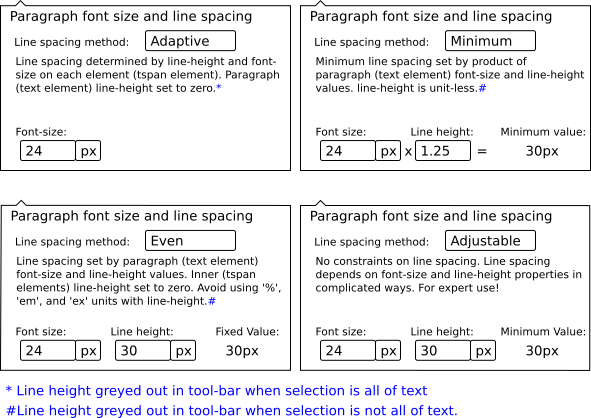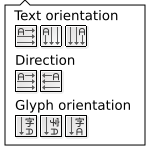Difference between revisions of "Text toolbar rewrite"
Jump to navigation
Jump to search
(Created page with " The text toolbar has become a monstrosity. This page is for discussing how to rework the toolbar into something more usable. ==Issues== * Text toolbar shows too many option...") |
m (→Line spacing: Fix grammar and typos) |
||
| Line 24: | Line 24: | ||
===Line spacing=== | ===Line spacing=== | ||
Line spacing is complicated: | Line spacing is complicated: | ||
* The minimum line-height is set by the 'font-size' and 'line-height' properties on the text element. | * The minimum line-height is set by the 'font-size' and 'line-height' properties on the text element. | ||
* 'line-height' and/or 'font-size' can be set on any tspan element. | * 'line-height' and/or 'font-size' can be set on any tspan element. | ||
* 'line-height' % values and pure numeric values have different meanings: | * 'line-height' % values and pure numeric values have different meanings: | ||
** %: 'line-height' computed values | ** %: 'line-height' computed values are determined by the element where the 'line-height' property is set. Once set, the computed value is inherited by all child elements. | ||
** Number: 'line-height' computed value is determined anew for each child element using the child | ** Number: 'line-height' computed value is determined anew for each child element using the child element's font-size and line-height values (which can be inherited). | ||
Inkscape has four options for determining 'line-height' behavior. Three of the options enforce certain rules: | Inkscape has four options for determining 'line-height' behavior. Three of the options enforce certain rules: | ||
# Adaptive: 'line-height' is set to zero on text element, this allows computed line-height to be any value in child elements. | |||
# Minimum: 'line-height' | # Adaptive: 'line-height' is set to zero on a text element, this allows the computed line-height to be any value in child elements. | ||
# Even: 'line-height' value is set on text element. line-height | # Minimum: 'line-height' value is set to some non-zero value on text element. This sets a minimum line-height computed value. Line spacing can be larger but not smaller. | ||
# Even: 'line-height' value is set on the text element. The computed line-height value is fixed, regardless of font-size in child elements (provided line-height unit is not '%', 'em', or 'ex'). | |||
# Adjustable: Inkscape enforces no restrictions on 'line-height' and 'font-size' values. The user must fully understand how 'line-height' and 'font-size' interact with inheritance. | # Adjustable: Inkscape enforces no restrictions on 'line-height' and 'font-size' values. The user must fully understand how 'line-height' and 'font-size' interact with inheritance. | ||
This proposal | |||
* If there is no selection (just a blinking cursor), font-size and line-height entries apply to entire text. | This proposal suggests making the selection behavior for font-size and line-height work like it does for all other properties: | ||
* If there is a selection (some text high-lighted), font-size and line-height entries apply to selection. | * If there is no selection (just a blinking cursor), font-size and line-height entries apply to the entire text. | ||
* If there is a selection (some text high-lighted), font-size and line-height entries apply to only the selection. | |||
The toolbar would be altered as follows: | The toolbar would be altered as follows: | ||
* The "Outer/Inner" button will be removed. | * The "Outer/Inner" button will be removed. | ||
* The "Line Spacing" menu will be replaced by a button that opens | * The "Line Spacing" menu will be replaced by a hamburger button that opens a dialog which will display the outer (paragraph) values for font-size and line-height, along with some text that changes depending on which method is selected. | ||
[[File:Hamburger_line_height.png]] | [[File:Hamburger_line_height.png]] | ||
===Text direction=== | ===Text direction=== | ||
[[File:Hamburger_text_direction.png]] | [[File:Hamburger_text_direction.png]] | ||
Revision as of 21:50, 11 June 2019
The text toolbar has become a monstrosity. This page is for discussing how to rework the toolbar into something more usable.
Issues
- Text toolbar shows too many options.
- Line height control is confusing.
Ideas
- Utilize "hamburger" menus to hide less used options:
- Either: Put all "overflow" options in one big menu.
- Or: Put options in to several menus
- Glyph tweaking (rotating, etc.). (Maybe not convenient.)
- Writing modes (vertical/horzontal, right-to-left, etc.). (These are usually set once and then forgotten.)
- Move some of the options to mini-dialogs.
- This could be useful, for example, where you want the controls readily available (like the glyph positioning ones).
- Mini-dialogs allow more text to explain what is happening.
- Should work well when we move to the tabbed dialog framework.
- Set a default line spacing option, require user to use hamburger menu (or mini-dialog) to change option.
- Which option should be the default?
Mock-ups
Line spacing
Line spacing is complicated:
- The minimum line-height is set by the 'font-size' and 'line-height' properties on the text element.
- 'line-height' and/or 'font-size' can be set on any tspan element.
- 'line-height' % values and pure numeric values have different meanings:
- %: 'line-height' computed values are determined by the element where the 'line-height' property is set. Once set, the computed value is inherited by all child elements.
- Number: 'line-height' computed value is determined anew for each child element using the child element's font-size and line-height values (which can be inherited).
Inkscape has four options for determining 'line-height' behavior. Three of the options enforce certain rules:
- Adaptive: 'line-height' is set to zero on a text element, this allows the computed line-height to be any value in child elements.
- Minimum: 'line-height' value is set to some non-zero value on text element. This sets a minimum line-height computed value. Line spacing can be larger but not smaller.
- Even: 'line-height' value is set on the text element. The computed line-height value is fixed, regardless of font-size in child elements (provided line-height unit is not '%', 'em', or 'ex').
- Adjustable: Inkscape enforces no restrictions on 'line-height' and 'font-size' values. The user must fully understand how 'line-height' and 'font-size' interact with inheritance.
This proposal suggests making the selection behavior for font-size and line-height work like it does for all other properties:
- If there is no selection (just a blinking cursor), font-size and line-height entries apply to the entire text.
- If there is a selection (some text high-lighted), font-size and line-height entries apply to only the selection.
The toolbar would be altered as follows:
- The "Outer/Inner" button will be removed.
- The "Line Spacing" menu will be replaced by a hamburger button that opens a dialog which will display the outer (paragraph) values for font-size and line-height, along with some text that changes depending on which method is selected.

